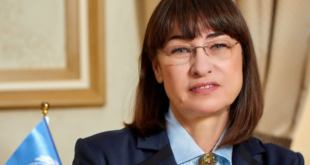Roadmaps developed by the Algerian military and opposition have not been able to gain a consensus, opening up the possibility of foreign intervention to find a settlement to the crisis in the country.
Ziad Akl*
The situation in Algeria is presenting a new model for the Arab Spring uprisings in which contentious politics and domestic tensions have been following the dimensions of the internal conflict.
In Algeria, the main cause behind the present changes in the country’s public sphere was the nomination of former president Abdel-Aziz Bouteflika to another term in office. This proposal gave rise to a wave of protests and activities by civil society that brought back collective action to the political scene. The fact that Bouteflika is now no longer present among the nominees for the leadership has created a dilemma within the ranks of the opposition, which lacks a common discourse and charismatic figures able to fill the void created by the former president’s absence.
The contestation between the forces of civil society and the opposition on the one hand and the Algerian army on the other is the formative factor on the Algerian scene today. The Algerian army is one of the most powerful military forces in the Arab world, and there is significance to how it has been politicised within the context of domestic Algerian politics over the past decade.
The Algerian army in the Algerian context does not only have a strategic role, but also a necessary political one. Former president Bouteflika was able to reconcile the interests of the army and the political institutions at the same time. However, this combination of political leadership and strategic interests requires time to materialise, and this is what Algeria lack at the present moment.
No comprehensive roadmap towards a solution to the crisis has been developed over the past few months. Both sides, whether the Algerian army or the opposition, have come out with political settlement plans, but these have lacked realistic mechanisms for implementation, making any consensual political solution appear a long way away from the current Algerian scene.
Political tensions and revolutionary ruptures like the ones Algeria is currently witnessing can be divided into three phases: revolutionary origins, revolutionary processes and revolutionary outcomes. Each of these phases has a set of factors that determine the final result. Algeria is still in the phase of revolutionary processes, which means that the mobilisation of the masses is still interacting with the state authorities to produce a political outcome. The Algerians have managed to orchestrate protests over the course of the past 16 weeks, during which time the opposition has secured several gains, including the resignation of Bouteflika.
Both the Algerian army and the forces of the opposition have developed roadmaps. However, none of these has been able to secure public support or gain a consensus. Implementing a political settlement in Algeria will require a minimum level of mutual agreement between the conflicting parties, something that is not present at the moment. The logical scenario would be to conclude that regional and international forces would intervene in order to design a process towards a political settlement. Actors like Egypt, Tunisia, France, the EU and the UN will most likely eventually intervene in the process towards a political settlement and reconciliation in Algeria in the interests of national security.
Egypt will likely eventually play a role within the Algerian conflict due to several factors. First, it holds the presidency of the African Union (AU) at the present time, and it is heavily concerned with zones of conflict and political tension on the African continent. Second, Egypt and Algeria are the two main powers, whether politically or militarily, in North Africa and the Arab world, and the withdrawal of Algeria from dealing with major issues in the region, like the Libyan situation for example, due to domestic tensions will negatively affect Egypt’s national security.
Third, Egypt’s approach towards zones of conflict in the region has shown a pattern within its regional foreign policy that dictates that internal solutions are found without foreign intervention. This means that reaching a political settlement to the conflict in Algeria is in accordance with Egypt’s wider foreign policy towards the region. Finally, Egypt believes that political instability will have negative consequences for the whole region, specifically regarding security matters, and this means that it will be involved in the Algerian crisis as well as in that in Sudan in accordance with its overall foreign policy.
All the givens within the Algerian scene point to the fact that process towards a political settlement in the country is at the moment far from being successfully implemented. The forces of the opposition, specifically the trade unions, and the army are on separate tracks. This suggests that a consensus is still far away under the political conditions that exist at the present moment. Algeria will remain within a contentious phase as long as the present state of mobilisation continues. However, it seems likely that regional and international actors will eventually step in to change the situation on the ground.
*The writer is a senior researcher and director of the Programme for Mediterranean and North Africa Studies at Al-Ahram Centre for Political and Strategic Studies.
From: Al-Ahram Weekly






